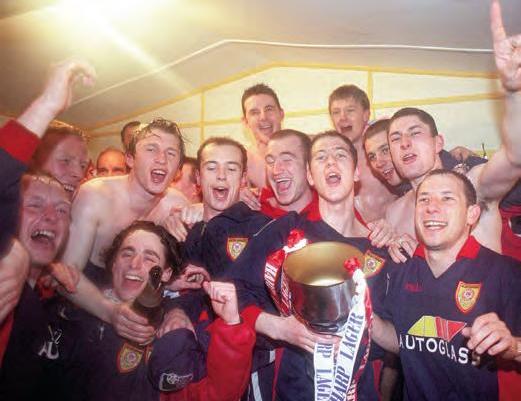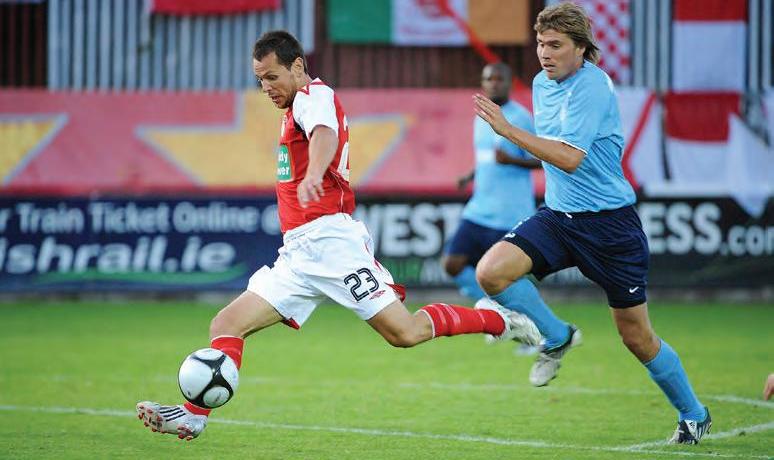
5 minute read
Oh My Word!
We love an anniversary around these parts. Another big one came and went last Saturday.
The previous night's 3-0 victory over Longford Town had put us in the optimal frame of mind. The date in question still rolls off the tongue: May Day '98. There's a certain ring to it. I have an idea what you're thinking: 2021 minus 1998 is 23. Twenty-three is hardly a "big" anniversary.
Advertisement
That's where I disagree, especially following the past year-plus, when watching clips of old games on YouTube has become comforting. The sights and sounds of supporters in a stadium is therapeutic. Good goals become great goals in jam-packed cauldrons of noise.
The silence of the past year has been deeply melancholic. Some subscribe to the view that football without fans is nothing. In a way, the pandemic has proven this to be incorrect. If the very existence of football depended on fans, the sport would not have continued to function. However, it is clear that interest in the top leagues is beginning to ail.
In a different time, this would have been regarded as a fascinating year for football across the continent.
La Liga is a four-horse race as they come down the home straight, with most neutrals rooting for Atletico or Sevilla over the big two. In France, Lille are positioned to do the improbable and deprive Paris StGermain of the French title. In England, Leicester City have qualified for the Champions League and reached the FA Cup final. And yet, people are tuning out.
Apathy has crept in. Never before have we witnessed, over such a sustained period of time, the extent of the contribution made by supporters. Their absence serves as a constant reminder. We now know that their very presence enhances the TV viewer's experience.
May Day '98 was special. Of course, it wouldn't have been half as special without the Pat's fans that night in Buckley Park, Kilkenny.
It was the final game of the season and a runners-up position was the likely outcome. In the lead-up, some supporters turned to faith. Each night, they prayed for a Dundalk victory against Shelbourne. Dundalk, with nothing to play for, had already lost to Shelbourne in their previous two league meetings that season. Even a draw would have been enough for Rico's Reds to clinch the title.
So fixated had the St Pat's community become about Dundalk's prospects that most of us failed to acknowledge the threat posed by Kilkenny City. This is illustrated by the chants of "we want seven" which rang out when Colin Hawkins fired Pat's into an early lead. The significance of scoring seven was that it would put us in a position to win the league, even if Shelbourne drew. It was a fanciful thought. Pat's had averaged a relatively low 1.4 goals per game in the season up to that point, so it was unlikely that they would rattle home seven on the final day.
In our defence, that hope was driven by the fact that Kilkenny City were not very good. They had 19 points out of a possible 96 and had already been relegated weeks earlier. The possibility of them causing a moment of worry appeared slim. That was the thought process before we knew about Michael Reddy.
Just 18-years-old, he was a Kilkenny lad playing for his local team. He had already featured in a handful of games for the team, but not enough to send shockwaves through the league. He waited for Pat's to do that.
In a breathtaking – and sometimes terrifying – display of pace and skill, Reddy could consider himself unlucky not to have scored at least once. During a seven-minute period in the second half, he orchestrated three one-on-ones. Only for the brilliance of Trevor Wood and some good luck, Reddy would have given Kilkenny the lead. Martin Reid had equalised before half-time. At Oriel Park, second-half goals by Keith Ward and Brian Byrne sent Dundalk into a 2-0 lead. Both goals were greeted with a huge roar in Kilkenny.
A sense of desperation was injected into the team's play. This was characterised by an abandonment of footballing principles in the pursuit of getting the ball up the pitch. Kilkenny, managed by a legendary figure in Alfie Hale, defended like their lives depended on it. The tension was unbearable. To lose out on the title by failing to beat Kilkenny City would have been gut-wrenching.
Eddie Gormley's goals were normally of the spectacular variety. However, his intervention that night was anything but. It felt like everyone on the pitch, apart from Trevor Wood, was camped in the Kilkenny goalmouth. The ball broke for Leon Braithwaite who attempted, unsuccessfully to control the ball on the edge of the box. Braithwaite lost his footing, prompting loud claims for a penalty. The ball rolled to Eddie, whose shot was not destined for greatness until it deflected off Reddy and rolled into the net, with a flatfooted John Connolly looking on in despair.
The pitch invasion and pile-on that followed prompted words from referee John Feighery to Pat's manager Pat Dolan. Whatever he said, it made an impact. Dolan pleaded with the fans in the stand behind him, as well as those in the terrace behind the goal, to "please move back". He repeated the request several times, gesturing with his hands and arms.
Amid all the mayhem, word filtered through that Stephen Geoghegan had pulled a goal back for Shelbourne. However, it would be their only goal. With the match over in Dundalk, the amateur whistlers among the Pat's following joined forces to produce a headacheinducing cacophony of noise.
That day was as much about the supporters. The memory of coachload after coachload pulling up outside the ground beforehand remains vivid. The flares, too. You always remember the flares.
When Feighery finally sounded the final whistle, the outpouring of joy was life-affirming to behold.
It was fitting that Eddie Gormley would be the man to hoist the trophy aloft after scoring the allimportant goal. But it wasn't the actual league trophy, merely just a stand-in that had been commissioned for a match between the League of Ireland and League of Wales. It is an unremarkable piece of silverware. On this night, however, it was a sight for sore eyes as it symbolised the team's status as champions of Ireland.
For some, May Day '98 ranks as their most memorable day supporting the club. Such special memories shouldn't just be dusted down every five or ten years. I'm already looking forward to the twenty-fourth anniversary in 2022.



